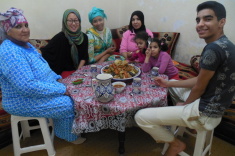I had a very interesting conversation with one of my boss’ maids, Hilda, after leaving “Wild is Life Game Park” last Wednesday. I was showing her pictures of the animals and enthusiastically talking about the cheetah and the kudu. She paused, thoughtfully, and asked, “Why is it that white people treat animals with more respect than they do black people?”
Wow.
Racism is endemic in Zimbabwe. This is probably due to the history of the country; the white colonialists coming, taking land, becoming prosperous, hiring blacks to be their workers and slaves; and then Mugabe taking everything away from the whites, often by violent means, putting land and property into the hands of inexperienced blacks, and subsequently ruining the economy.
The racism that I’ve experienced (both personally and on the sidelines) has been one of the most difficult aspects of being in Zimbabwe. And though some of it has been black-to-white racism (mainly blacks believing all whites are rich, and looking at them all as oppressors and enemies), most of the racism I’ve experienced has been white-to-black. I’ve had white farmers tell me that if I dated a black man that I shouldn’t come around to visit them anymore. I’ve seen black workers being treated as donkeys meant only to carry their owners belongings. And I’ve seen black employees verbally abused countless times.
Hilda is not wrong to ask this question.
What I didn’t realize was the workers’ view of my bosses. When I look at the way they treat their black employees , I am appalled. But according to Hilda, they treat their employees quite well compared to most. Some white bosses don’t let their workers use the same toilets, sit in the same car, use the same mugs or utensils – I mean, Indian untouchable kinda stuff! The fact that my bosses don’t view their employees as having some sort of cooties apparently means that they are good bosses, never mind the fact that they still view them as inferior, unintelligent people.
However, all is not bright and rosy in Hilda’s life. Despite the fact that she works anywhere from 10-14 hours a day, 7 days a week, she only makes $55 a month. This is the same as the field workers who work 8-9 hours a day and have Sundays off. I asked her why she is still at this job, then, and why she hasn’t asked for a raise. She said she once tried, but that her boss said that this was the salary, take it or leave it. Hilda is a single mother of two and received no financial support from her ex-husband. As such, she feels stuck to this job, helpless to improve her situation. She doesn’t even have the time to go and look for another job, and she cannot leave this one before finding an alternative.
The cycle of poverty is incredibly difficult to escape. Most people my age have less money than Hilda, because they have school debt. But the difference is, firstly, that we can get a loan – banks would never loan money to Hilda – and secondly, that, because of our education, we have opportunity. This is something Hilda will never have, and something that she even struggles to provide her children with. School fees at the local government school are roughly $20 per month (plus books and uniforms), but these schools don’t lead to proper futures. The ones that do are unaffordable to Hilda; and anyway, in this Zimbabwe economy, there are so many educated young people who are unemployed that it’s no longer a matter of an investment yielding a return anymore.
Unless times change, both economically and with class structure, I fear that Hilda’s children, and Hilda’s children’s children will not be any better off than she, whose life is only worth $55 a month and who wonders at night why the animals outside her walls are more beloved than she.
Wandering Footsteps: Wandering the World One Step at a Time » A travel journal following a family on their overland trip around the world.
|
|
|



Claire - Hi Brittany
This post upset me, and made me so glad to be in Canada. You have a very good handle on the situation in Zimbabwe. I do not miss the awful undercurrent of racism that abounds in Zimbabwe.
xx Claire